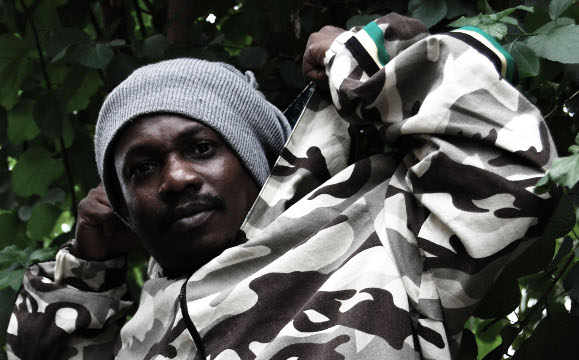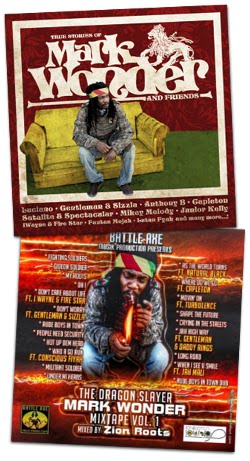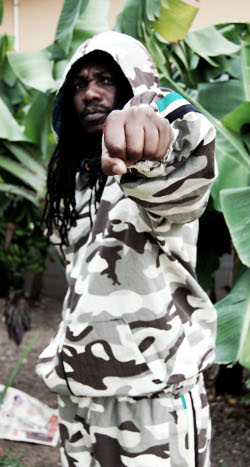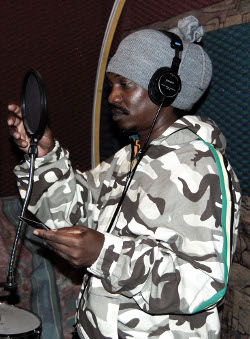Articles about reggae music, reviews, interviews, reports and more...
Interview: Mark Wonder
- Home
- Articles
- Interviews
- Interview: Mark Wonder

Interview: Mark Wonder
"Reggae Sumfest. I call it "Some Reggae Fest". How can you have a reggae festival being headlined by a hip-hop artist?"
Sampler
Mark Wonder - who took his stage surname from Stevie Wonder - was born in Kingston and grew up in Manchester, Jamaica. He originally decided to train to become a jockey but was unable to produce the necessary paperwork and instead found his way into music - recording his first tunes for Jack Scorpio in 1988. In a familiar story for an uncompromising roots artist his debut album 'Signs Of The Times' was recorded for a European label, Zola and Zola out of the Netherlands in 1996 and he has continued to release most of his works in Europe rather than his island home. Last year he dropped his fifth longplayer - 'The True Stories of Mark Wonder and Friends' - a collaboration with Austrian label IrieVibrations and Jamaica's Al.Ta.Fa.An. which features a huge number of guest contributions from Sizzla, Gentleman, Anthony B, Capleton, Luciano, Junior Kelly and Everton Blender. Angus Taylor spoke to Mark as he was finishing sixth album 'Working Wonders' with Bavarian production house Oneness Records - about his music, his love of horseracing and why he feels there is a plot in Jamaica to keep Rastafarian roots artists down...

How did you get so many people to collaborate with you on The True Story Of Mark Wonder and friends?
Well, first let me say "Greetings" to the most high. I want to say "Big up" to the artists who've lent their talent to this project. I've been around in the industry for more than 15 years, so most of the artists, I've known them for quite a long time. It wasn't really hard to get them to collaborate with me, it was just getting the time because everybody had their own stuff going on and it was just some of it took long time, so that was really hard.
How long a period of time did it take to get all those people together?
We had started recording a few singles before Al.Ta.Fa.An the producer came up with the concept - the first one was Only the Strong Survive with me, Chezidek and Lutan Fyah. Then there was Still Deh Deh. So after those two singles the producer decided he wanted to do a project with me for Al.Ta.Fa.An. At the time I was working on several other projects, so he decided to let me do something different from the rest of the projects that I was working on. Obviously we had to choose the people we wanted to work with, make sure we had the right concept and songs. It took us about a year and a half to really get the project kicking and feeling. The project was ready for a while but we had to make sure we were getting a proper distribution. That's the thing that is hurting reggae the most at the moment - not getting a proper distribution.
I hear that a lot.
 So it took us until last year for us to really seal up a distribution deal. I'm pretty much grateful for that, you know? The album was produced by Al.Ta.Fa.An, it ended up being a collaborated effort between Al.Ta.Fa.An and IrieVibrations from Austria. The project was distributed to Europe by Groove Attack.
So it took us until last year for us to really seal up a distribution deal. I'm pretty much grateful for that, you know? The album was produced by Al.Ta.Fa.An, it ended up being a collaborated effort between Al.Ta.Fa.An and IrieVibrations from Austria. The project was distributed to Europe by Groove Attack.
You also put out a mixtape with Zion Roots from VI which went down very well. Tell me about that.
Well, it was just a concept that came to me while I was on tour in Europe last year, in France, Germany, Switzerland, Belgium, Holland. Whilst stopping over in Germany, Gütersloh to be exact - big up the G Town Massive - I was just toying with the idea of the name Dragonslayer, and I was saying to another person, my touring partner Prince Theo, who was along with me on the tour that I wanted to make an album by the name of the Dragonslayer. So while back I was in Jamaica, after the tour was finished I got hooked up with Zion Roots, who's from St Croix - big up Zion Roots, big up the St Croix massive. Zion Roots is actually living in an estate in Washington - he lives in the United States. The good thing about Mark Wonder is that the music has been making grounds in those parts of the world and I hooked up with Zion Roots. He seems to be a very strong follower of Mark Wonder, so we hooked up and he has done the mixtape for me. I think it has done very, very well.
Am I right in saying that some of the tunes on that mixtape have not been released yet? I heard one or two that I was like "Where can I find that?"!
Well, I deliberately was sneaking a few pre-release, you know? We put out some early release stuff to create the concept that we had wanted! We had to sneak in just a few new releases. Hopefully by the end of the year the songs will be out.
Tell me about this Dragonslayer concept. Do you see yourself as a dragonslayer in the industry?
Yes, kind of. When I look back on I and I journey through the music, as a being on the earth there is so much hypocrisy going on in the music, so much catastrophe taking place. And I have to do something about certain situations where there's just talking talking and words without works are not sustainable. So I see myself in this time forward as a battler who comes to wipe out certain situations and we get this tool to use which is the word sound. And through the word sound I and I sound I and I trumpet in a melodic vibration and also in like-mind reaching words. In these situations we utter these words. That is I and I tool that Jah Rastafari has given I. Babylon quake because I and I utter it in this time carrying on the works that were started by our brothers before. People like the Wailers - Bob and Peter who came before I and I, Burning Spear, Israel Vibration, The Abyssinians, Jimmy Cliff, Bob Andy. All those great warriors who went out and create an energy, a vibe, you know? Create that vibe that speak very much about our culture, our struggle, our needs, our wars, our vigil. So I and I in this time is the Dragonslayer, reminding I and I from whence I and I came and that's what this music is all about.
 There is so much hypocrisy going on in the music, so much catastrophe taking place
There is so much hypocrisy going on in the music, so much catastrophe taking place
Do you think that the purpose of this music has got lost in recent times?
Well, I wouldn't say it was lost, I wouldn't say it was that bad. I'm there and a lot of the other veterans are there, a lot more I and I there. The thing is that basically I can speak of Jamaica. It seems that this roots is lost here in Jamaica and I wonder what is happening. People are now gravitating towards a different type of vibration and living a culture which they are not, basically. I think there is a plot to get rid of roots but my theory is - how can you kill the root? If you kill the root there will be no future because the root is the foundation and if you kill the foundation and kill the roots then all the branches are going to die. There will be no substance in the other parts of the music if you kill the roots. So I and I duty as the Dragonslayer is to restore the order and be one of those who will be a solid foundation in this time. It's going to take a hefty and mighty lot of work to restore this order so as the Dragonslayer I man in this time step forward free and bold, mighty and strong and as Bob Marley did say "Nah look no help" and him no want no help so I and I ain't going to look no help and just be there to do Jah works and restore the order.
There has been a lot of debate recently about reggae in Europe versus reggae in Jamaica. As an artist from Jamaica who records regularly for the European market what is your view?
I am just very, very sad about the situation. That's why I have come to this realisation that there seems to be a plot to kill this rootical vibration. How can we destroy something so ancient? Something that has a purpose to be recognised throughout the world? This art form, this music, that served to establish us as a nation and as a people. The music that speaks of I and I courage and I and I livity. The people are gravitating to different vibes and living a culture that they are not. I feel really sad about the situation because when I trod through Europe I see so much roots and people living the culture. Then I come back to Jamaica and it's not so - the radio, the TV, the newspaper. I'll tell you the truth - it all boils down to hypocrisy. The reggae music industry in Jamaica is like a pimp and prostitute game.
 People are now gravitating towards a different type of vibration and living a culture which they are not
People are now gravitating towards a different type of vibration and living a culture which they are not
How do you mean?
 That's the way I see the industry -a straight pimp and prostitute game. The roots is lost in the middle because the rootsman lives a different culture. He believes in a different situation. He thinks differently, so he is not caught up and involved in the pimp and prostitute game, so the roots gets squeezed. Then you travel the world and you see so much roots. I was in France last year and I went to one session and it was something to behold. I mean back in Jamaica you never have this music in your collection - you never hear this music. They are keeping all the big music festivals, the Reggae Sumfests. I call it "Some Reggae Fest". There is so much heritage and history of roots music and others genres of music like dancehall - and yet still people have to go abroad to get artists - hip-hop artists, R&B artists - to be headliners for a reggae festival. That means there is something wrong. How can you have a reggae festival being headlined by a hip-hop artist? So I think the people in high places are the ones who are helping to create this situation and pushing the roots aside. We're talking about the media, the radio stations, the television, the newspaper writers, the people who keep shows - what happened to our roots?
That's the way I see the industry -a straight pimp and prostitute game. The roots is lost in the middle because the rootsman lives a different culture. He believes in a different situation. He thinks differently, so he is not caught up and involved in the pimp and prostitute game, so the roots gets squeezed. Then you travel the world and you see so much roots. I was in France last year and I went to one session and it was something to behold. I mean back in Jamaica you never have this music in your collection - you never hear this music. They are keeping all the big music festivals, the Reggae Sumfests. I call it "Some Reggae Fest". There is so much heritage and history of roots music and others genres of music like dancehall - and yet still people have to go abroad to get artists - hip-hop artists, R&B artists - to be headliners for a reggae festival. That means there is something wrong. How can you have a reggae festival being headlined by a hip-hop artist? So I think the people in high places are the ones who are helping to create this situation and pushing the roots aside. We're talking about the media, the radio stations, the television, the newspaper writers, the people who keep shows - what happened to our roots?
More and more Jamaican roots artists are working with European producers. Is this the way it's going?
I can only talk about myself and the last situation I had out of Jamaica is The True Story. There are a lot of people that say they are producing roots music but a lot of them lost the feel. There is no energy, there is no feeling in it. There is no hyper spirituality - it's just some guy saying "I'm going to make a one drop rhythm". The music has lost its essence but then you find Europeans really putting their heart and soul into it and really taking the music by the scruff of the neck. I am a rootsman and I have to find and sort out my situation so I have to record with roots people in Europe. Most of my things that have been released over the past two or three years have been on European labels. Jamaica is sleeping. Wake up Jamaica! Wake up people of Jamaica!
 Jamaica is sleeping. Wake up Jamaica!
Jamaica is sleeping. Wake up Jamaica!
What took you to Rastafari as a youth?
Well, from a long time as a youth I trod in the ghetto and I was always inspired by the movement of the Rastafarians - just by the way they live, the way they speak, the whole vibe of their cultural behaviour and patterns. Their spiritual highness and also their kingly character. So after years of growing and living amongst men and people finally I decided that this is a choice that I and I going to make in my life. That whatever change I made in my life this was the sort of vibes that I and I was going to make. So from early I found myself gravitating to this movement, to this culture, to this livity. So it was no surprise that I just found myself one day saying "This is the choice that I am going to make. This is the livity. This is the spiritual heights that I am going to seek and I want to reach". It just happened naturally. There was no strain, no pain. A lot of it came through wanting to know more about I and I black self. I and I as a nation, as a people, and I and I as an individual.
As you said in previous interviews you were involved in horse racing as a youth? But fate intervened and set you on the path to music?
Well, as a youth growing up in the ghetto in Kingston the community I resided in had a lot of thoroughbred farms and a lot of people involved in horse racing - jockeys, grooms, trainers. We used to enjoy racing marbles as youngsters - that was a considerable part of our fulljoyment. When we were not going to the track we would go by a complex where there was a factory with corridors where we could race marbles. And from there a lot of us would go down to the track. I would find myself stealing away from school and going over to the track at Caymanas and just hanging around with the whole population of the game itself. We would hang out with a lot of grooms and a lot of trainers and a lot of jockeys. I had a lot of jockey friends and they introduced me to the game in a bigger way. Then the industry started to make a change because back in the day a lot of youths who entered into the game were trying to project themselves so the Racing Commission opened a jockey school. So after hanging out at the stables for a while I decided if I was to be a jockey that was the route I had to go down because that was the new system set up by the Racing Commission so I enrolled in the jockey school. But as you said, fate put me on another path. The music came calling because the music was always a part of me and I was always a part of the music so I am here today as Mark Wonder, the Dragonslayer.
You aren't the first reggae artist to have come from that background. Donald Manning from the Abyssinians and Cocoa Tea are involved in the game. Is there anything from being a jockey you can take into music?
In my upbringing being around horseracing you can compare a lot of things you see going on in horseracing with the music industry. It's about the same thing. In horseracing you have a lot of people who do a lot of work but never get highlighted, people who do a lot of work behind the scenes and never even get mentioned. Just like in the music industry where you have a lot of unsung heroes who do a lot of work and never get any credit or any mention. There are a lot of comparisons I can make between the industries.
 You can compare a lot of things you see going on in horseracing with the music industry. A lot of people who do a lot of work but never get highlighted
You can compare a lot of things you see going on in horseracing with the music industry. A lot of people who do a lot of work but never get highlighted
Do you still get involved in horses at all?
Yes. I'm not an avid gambler per se but I just love that fact that I can give credit to the sport of kings because I am a king and it is my sport. So I am into horseracing just as I was in times gone by. The thing is I don't really gamble like I used to but I just take joy in watching the races and I have my favourite jockeys and my favourite trainers.  I am just a big fan of the sport and I love it dearly. I still go down to the track now and again, I catch the coverage on the radio and I still follow the sport a lot.
I am just a big fan of the sport and I love it dearly. I still go down to the track now and again, I catch the coverage on the radio and I still follow the sport a lot.
You have a new album in production Working Wonders on Oneness Records - what can we expect?
I can safely say the world can look forward to this album. I have to say big up to Oneness out of Germany and big up Moritz from the Oneness crew who I have been working with as co-producer because I am co-producing this project with my own Battle Axe imprint so this is a collaborative effort between Battle Axe and Oneness Productions. So I can tell you this going to be a gem - listening back to the tracks and getting feedback from others both inside and outside Jamaica. Most of the tracks are mixed. Actually there is a late track that is going to be added and we were just discussing the situation yesterday. It's a track with Sizzla that we are just putting the finishing touches to. We haven't come up with a release date yet for the is project because The True Story is still doing well so there is no need to rush putting it out. We are just biding our time. When you release a project the time has to be right to unleash it!
Read more about this topic
Comments actually desactivated due to too much spams
Browse by categories
Recommended Articles
Latest articles
Recently addedView all
© 2007-2026 United Reggae. All Rights Reserved. Reproduction in whole or in part is prohibited. Read about copyright
Terms of use | About us | Contact us | Authors | Newsletter | A-Z














